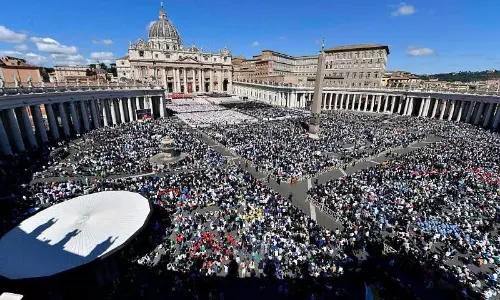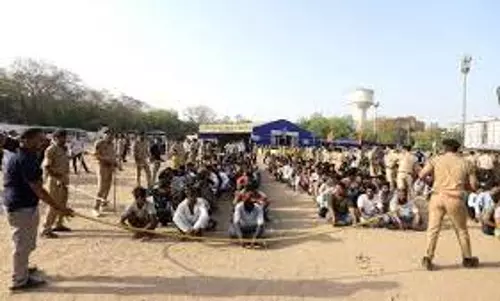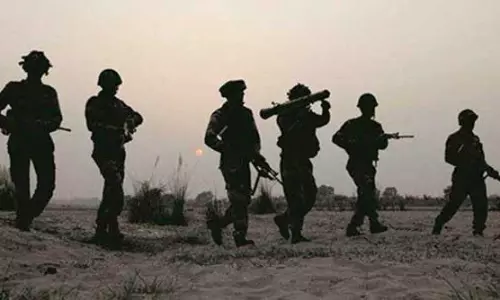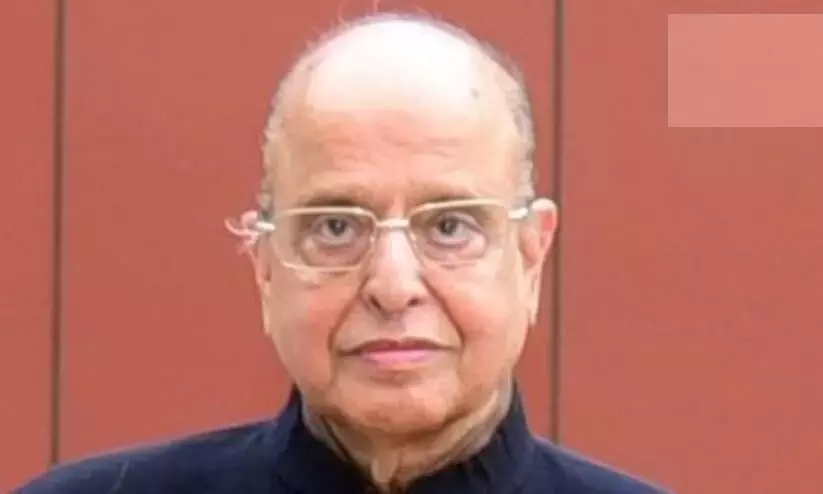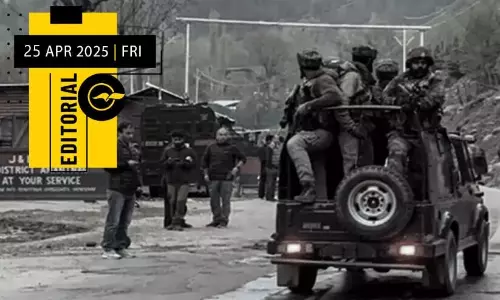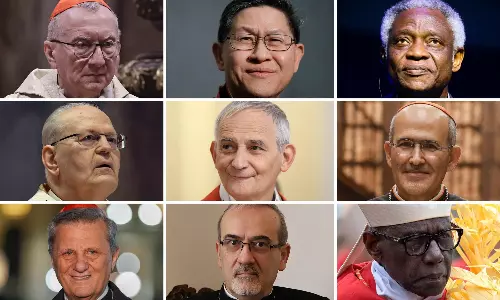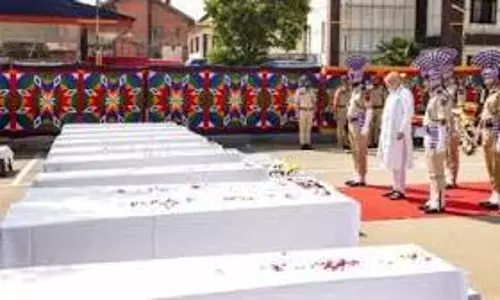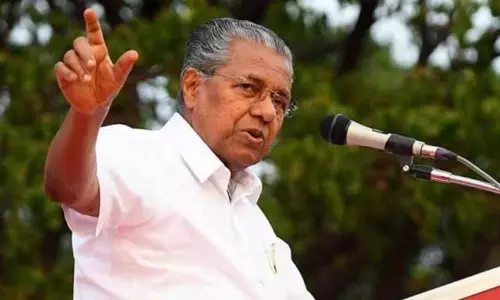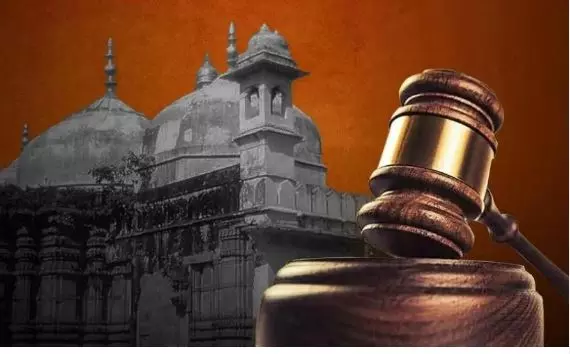
Gyanvapi: The court's ruling and Sangh Parivar's longing
text_fieldsWith the Allahabad high court allowing a scientific survey of the Gyanvapi mosque in Varanasi by the Archeological Survey of India, Muslims at large are apprehensive that this will pave the way for an Ayodhya-like situation finally resulting in the right-wing organizations muscling their way into the mosque and converting it into a Hindu shrine.
Even the All India Muslim Personal Law Board has taken a serious view of this order and issued a statement to say that it was indeed unfortunate that even the Supreme Court refused to intervene in the matter. In a statement issued on August 5, 2023, the AIMPLB spokesman Dr SQR Ilyas said the order by the high court and the Supreme Court’s refusal to stay this order was “ against the law and principle of secularism.” Describing the order as “ surprising and unfortunate” the AIMPLB statement said the Board, along with the Muslims of the country were “ deeply disappointed with the order.”
The statement quotes Dr Ilyas as saying that the apex court was expected to intervene in the matter as giving an opinion based on this survey would amount to giving a nod to changing the religious character of the mosque, something which has been prohibited as per the Places of Worship Act 1991 which mandates that the religious character of a place of worship should be maintained as on August 15, 1947. This act had only made Ayodhya as an exception. Delivering its Ayodhya verdict in November 2019, the Supreme Court had however, reiterated that the law would hold in the case of Kashi and Mathura shrines where a temple and mosque stood adjacent but the Hindus were making a bid to reclaim the shrines. Dr Ilyas said the court judgements, from the lower court to the Supreme Court, are “ bound to create new conflicts and quarrels and are contrary to the 1991 Act.”
Even as the ASI survey continued inside Gyanvapi mosque, the Anjuman Intezamia Masajid, the mosque managing committee, too has expressed similar apprehensions. “ I shudder to think what would happen because this clearly looks like heading in the same direction as Ayodhya. If the SC allows Hindus to take control of the mosque then no force on earth can prevent such controversies from breaking out in every street, every mohalla, and every city in India. I can't even imagine the consequences, says S M Yasin, secretary of Anjuman Intezamia Masajid.
Such fears are justified because the court order has opened a can of worms by giving approval for the survey specifically to ascertain whether the over 600-year-old mosque was built over the ruins of a Hindu temple which was demolished by Mughal emperor Aurangzeb.
The nod for the ASI survey is also surprising for another reason. The Supreme Court is already looking into petitions challenging the constitutional validity of the Places of Worship Act, 1991, which was enacted by the Narasimha Rao government in the wake of the Babri masjid demolition in order to forestall Ayodhya-like catastrophic events. The act had specifically excluded Ayodhya from its ambit and mandated that the religious character of all other religious places should be maintained as on August 15, 1947. But this ASI survey is going to definitely start a clamour for restoring the Gyanvapi mosque to Hindus because there are telltale signs that there indeed was a temple where the mosque stands today. In fact, the ruins of the ancient temple are visible even to the naked eye, even from a distance, on the outer walls of the mosque. Even the AIMPLB has wondered, why to order a scientific survey now because the law of the land, as it stands today, forbids changing the religious character of this shrine?
It is a fact that a tragic historical chain of events had seen marauders invading the country and destroying temples to build mosques over them but once India became independent, the country decided to embrace this tragedy and move on. After hundreds of years of subjugation, first under the Mughals and then under the British, once India gained freedom it sensibly decided to bury the past and move forward to build a new modern, progressive, self-reliant and inclusive India. India, which has a unique diversified culture, where people belonging to different religions, castes and creeds live peacefully together, set an example for the world to see what “ unity in diversity” actually meant. But all that started changing once the Hindutva forces started flexing their muscles. By revisiting the religious character of structures so that these historic wrongs could be set right, the country’s apex court, which is supposed to be the legal custodian of a “ sovereign, socialist, secular, democratic republic” has opened Pandora’s Box.
The Gyanvapi controversy hit the headlines when in 2021 a fast-track court in Varanasi ordered the Archaeological Survey of India to conduct a comprehensive survey of the Kashi Vishwanath Temple-Gyanvapi mosque complex in Varanasi, to find out whether a Hindu temple was demolished there to build the mosque which stands today adjacent to the temple. The order had come on April 8, 2021, on a petition by Vijay Shankar Rastogi. The Allahabad High Court bench of Justice Prakash Padia, however, on September 9, 2021, put a stay on the Varanasi civil court order saying the matter was already pending for consideration before it so the lower court should have refrained from passing such order. The plea for the ASI survey rested there. But in the meantime, in August same year five Hindu women, Rakhi Singh, Sita Sahu, Manju Vyas, Laxmi Devi and Rekha Pathak petitioned the Varanasi civil court pleading that they be allowed to offer puja to the Shringaar Gauri shrine located on the outer western wall of the mosque on a daily basis. They also pleaded that they are allowed to offer daily worship to all other visible and invisible deities present inside the mosque building.
Passing the order on this petition Varanasi civil judge, Ravi Kumar Diwakar, on April 26, 2022, ordered a survey and videography in the mosque complex, under the supervision of a court-appointed commissioner Ajay Kumar Mishra. The survey was conducted on May 6-7, 2022. But when the court-appointed team tried to enter the mosque building they were prevented from doing so by members of the mosque management committee. The mosque management committee approached the court demanding to change the court commissioner. This plea was, however, rejected by the Varanasi civil court which ordered on May 12, 2022, that a comprehensive survey and videography be conducted inside the mosque too and all should cooperate. This survey and videography have now been completed and the report is with the Varanasi civil court. The matter is pending. This entire exercise had, however, resulted in another controversy. Leaked reports suggested that a Shiva linga has been found in the mosque complex, which the mosque claimed was a fountain which was used as wazukhana by Muslims. The Supreme Court in May last year, sealed this area, pending further studies. The petition for worship at Shringaar Gauri filed by the five women is still pending before the Varanasi court.
In August last year, the same women, except Rakhi Singh, approached the Varanasi civil court again, demanding the ASI survey of Gyanvapi mosque. Intriguingly enough, even as such an order was stayed by the Allahabad high court in September 2021, the Varanasi court ordered the ASI survey on July 21, 2023, and the survey began the next day, on July 22, 2023. But the Muslim side again got a stay order from the Allahabad high court till August 3, 2023. The Allahabad high court, however, gave a nod for the survey on August 3, 2023, and the Supreme Court refused to stay this order. On August 4, 2023, a 41-member ASI team, led by Prof Alok Tripathi, additional director general, started the scientific survey which would include differential GPS (DGPS) mapping, imaging, photography and videography. The SC has directed the ASI team to not conduct any “ intrusive act” during the survey. This means no digging or scraping any structure.
But what Muslims now fear is the fact that once the details of this survey come out in the public domain, those demanding that the mosque be handed over to Hindus would only increase their decibel levels. It is surprising that the Chief Justice of India D Y Chandrachud himself, along with Justice J B Pardiwala and Justice Manoj Mishra was on the bench which refused to stay the survey order. Here it may be mentioned that the chief justice of India at the same time is listening to petitions challenging the constitutional validity of the Places of Worship Act 1991, which has been filed by BJP leader and advocate Ashwani Upadhyaya and former BJP MP, Subramanyam Swamy.
What is disconcerting is the fact that despite the case being under consideration by the Supreme Court for over two years now, the government of India is not clarifying its stand on the Places of Worship Act and is seeking time from the SC again and again. The last such request from the GOI was on July 11, 2023, when the solicitor general Tushar Mehta once again pleaded more time for the government to make up its mind about the law. Besides the CJI, this bench also comprises Justice P S Narasimha and Justice Manoj Mishra. The case will now come up for hearing on October 31, 2023.
But as anticipated, even as the ASI survey continues, it has to submit the report by September 2, 2023, as the clamour by right-wing organizations has begun. “ It is already clear that the temple remains are there inside the mosque. Once the report comes out, no court can deny us the control,” says Sudhir Singh, president of Kashi Vishwanath Mukti Andolan. UP CM Yogi Adityanath has already said in an interview with ANI that he will be bound to implement the court orders as and when it comes.
There is enough indication now that the Sangh agenda on Kashi and Mathura is well on its way to implementation because the RSS chief, Mohan Bhagwat, who was present in Varanasi on the day the ASI survey was being done, declared in a separate programme that it was time for India to assert its Sanatan dharma.







